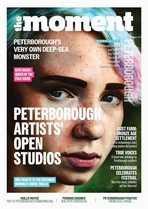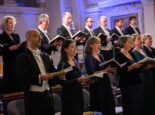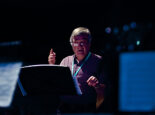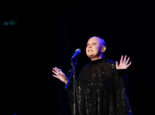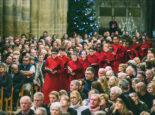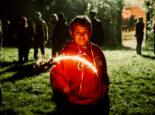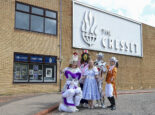Peter Robinson: “Crime writers are generally very nice and gentle people…”

On 28 July Peter Robinson – creator of DCI Banks – comes to Vivacity’s Central Library to meet readers, sign books, and talk about the latest Banks novel, Sleeping in the Ground. One of the world’s leading crime writers – the latest in a range of top authors to visit Vivacity libraries – he has won no fewer than 18 awards, and this year celebrates the 30th anniversary of DCI Banks’ first appearance in print. Toby Venables talks to him about influences, TV adaptations and his life of crime...
What were your earliest influences – the things that made you fall in love with stories and then want to write your own?
I should imagine it was growing up with the same books most kids of my generation did. I started off with Enid Blyton – Famous Five, Secret Seven and ‘Adventure’ series – then step by step graduated to to Sherlock Holmes, Agatha Christie, The Saint and James Bond, along with a fair bit of science fiction from the likes of Arthur C Clarke, Philip K. Dick, Robert Heinlein, Theodore Sturgeon and Ray Bradbury. I also used to love that Pan Book of Horror Stories series and managed to collect just about every one, mostly second hand editions from Stringer’s stall in Kirkgate market, Leeds. I wish I still had them. I still remember images from some of the stories, but I have no memory of what the stories were called or who wrote them.
What was the earliest piece you wrote with an awareness this could move people?
Strangely enough the earliest piece I wrote that I was aware could move people was a poem. I can’t remember which one it was exactly, but I started doing poetry readings at pubs and folk clubs around the Leeds area in the late sixties, and that wasmy first experience of communicating something to an audience Who are the writers who most influenced you – who you feel are somehow part of your DNA, even if it may not be obvious? In addition to the writers mentioned above, Thomas Hardy and Graham Greene are both unlikely influences, and perhaps more likely are the European crime writers such as Georges Simenon, Maj Sjowall and Per Wahloo, Nicolas Freeling and Janwillem van der Wetering. I read them even before I discovered Ruth Rendell, P.D. James and Reginald Hill.
Was it always crime fiction that drew you?
No. My first love was poetry, and I’m still a fan, though I don’t do much more than jot down the occasional image or observation these days. The fiction seems to draw all the energy I used to have for poetry.
Crime is pretty plot-driven. Do you outline the books in detail before you start writing? Has your approach changed over the years?
No, I’m not an outliner. Sometimes I wish I was. I just jump into the opening scene, usually the discovery of a body, and take it from there. I come up against brick walls and paint myself into corners, but it usually works out in the end—or so I keep telling myself! I’ve always worked that way, so if I find myself in real difficulty I can usually console myself by telling myself I’ve been there 27 times before and it worked out all right. I don’t do the same thing time after time and expect a different result, which is Einstein’s definition of madness, so as crazy as my system sounds, it’s clearly quite sane.
How much research is involved in getting police procedure right? Do you ever bend the truth?
Fiction always wins out over research. It has to, as much of the procedure is dry and dull, and who’d want to read a dry and dull novel? I try to the give the impression that what’s happening is realistic, but I take liberties all the time. At first I knew nothing at all, and took all my procedure from other novels I read. As many of those were European, I was probably wildly inaccurate! Then I got to know a few police officers, including some who had kindly sent me emails pointing out mistakes. I learned to ask questions and think I got a better all-round grasp of the procedure. Usually I write the book first and then ask my questions, which are more a matter of how can this go wrong than how would you handle this. Now I don’t do as much research for each book and tend to concentrate more on the characters and relationships than mechanics of investigations. But the bare bones are still there.
Do you ever have feedback from police officers about the books?
Most of my police friends who read the books—except the ones who send me emails—say they don’t really care about whether my procedure is accurate as long as the story and characters work for them.
For police officers, of course, murder is very real. Is this one of the reasons so many fictional detectives are loners – single, divorced, self contained – because it’s hard for others to grasp what they deal with on a day-to-day basis?
The police career can be hard on relationships, it’s true, but it can also form very strong bonds as well. I doubt anyone goes home after a particularly violent murder scene, especially if children are involved, and has a good night’s sleep. I’d probably turn to the bottle, myself. On the other hand, that’s where a lot of the dark humour comes in. It’s no mere invention that police use humour in the most disturbing situations. I’ve always thought my books are a lot funnier than most people say.
Do you ever find people are unnerved by your interest in murder..?
Occasionally. But I tell them crime writers are generally very nice and gentle people because they get all that violence and angst out in their writing.
Has there ever been a point where you started to write something but thought ‘No, I can’t write that…’
No. Unless it was a really bad idea. I suppose I unconsciously censor my subject matter to a degree. I have no desire to wallow in sadistic violence for gratuitous reasons, but at the same time, I don’t want to present an upsetting scene in a sanitized way. I try to make the crime scenes as realistic as I can, and beyond them, there isn’t a great deal of violence in my books. Aftermath is probably the most violent, but I’ve always told people that when they get past the first chapter they’ll be fine with it. I suppose it’s my background in writing poetry and reading a lot of horror fiction that I like to put in the creepy little details and images that give some people the shivers, like the toes sticking through the dirt like mushrooms in Aftermath.
Banks was born in Peterborough. Obviously we applaud this decision, but why Peterborough?
I thought I was being clever. I wanted to avoid autobiography at all costs, so I had to have him come from somewhere other than Leeds. My name’s Peter and he’s from my ‘borough, so Peterborough seemed a natural choice, even though I’d never been there. It caused me no end of problems when I wrote The Summer that Never Was, about Banks returning to solve a childhood murder in his home town. I had a lot of help from the local historic society, though, and visited Peterborough a number of times to do research. I must say, though, I’ve often wished I had him come from Leeds. It would have made some things much easier.
Were you nervous about the books being adapted and cast for TV, and has it been a pleasurable experience?
I wouldn’t say I was nervous about it, though I already knew enough writers who’d had bad experiences with TV. Many said just take the money and turn your back. But I watch quite a bit of crime TV and I’m interested in the process, so I visited locations a few times, had meetings with the producers and so on. I never had any real influence on what happened, though if I said something in a script didn’t work for me and Stephen Tompkinson agreed, they would change it! The problem was that so many of the original production team left early on, and I don’t think it ever gelled after that. We also lost Andrea for the whole of the second season, which brought in the wonderful Caroline Catz, but messed up the team dynamics a lot. So it’s been an experience like many others, full of highs and lows. I must say it seemed to trail off towards the end, and I put a lot of that down to moving away from the books!
In a Dry Season is regarded by some as the best of the series so far. Do you see that book as in some way distinct and different from the others, and was there a desire when writing it to push things further than before – or is that an ever-present urge?
In a Dry Season was definitely a breakthrough for me, so it’s often a book I recommend when people want to start reading the Banks series. Unless they simply have to start at the beginning, of course. In a Dry Season really brought to the fore my interest in research and using the past in juxtaposition to the present, as well as telling the story from different viewpoints, and I think that impulse has remained with me in one way or another throughout almost the books that have followed, some more than others.
I’m always fascinated by stories, situations and characters that are maintained over a very long period of time. Has Banks evolved in ways you could not have predicted?
I think I would be bored with him if he hadn’t. He was in his early thirties when the series began, and he’s in his early sixties now, so he has been through the same experiences as many others have during that stage of life—a broken marriage, the kids leaving home, death of loved ones and so on. Naturally, these things have changed him, and he has become more isolated, melancholy and philosophical then he was when he was a brash young copper newly transferred to Yorkshire.
Music is very important in the books. How and why did that come into the mix? Has this created a whole new level of enjoyment and discussion among fans?
Music has always been a big part of my life, from early Elvis (the first music I remember hearing), through to The Beatles, Dylan, folk and blues, sixties psychedelia and then on to jazz and classical music. I probably listen to more classical than anything else these days, mostly chamber music. I wanted to give that love of music to Banks in the series partly to indulge myself but partly to help make him something other than a mere crime solving machine. Obviously, the music element is of more interest to some people than others. I sometimes get people saying they don’t care about it and wish I’d stop (which I won’t), but far more people tell me they’ve discovered something they hadn’t heard before through reading the books. Using music in the books has also made my life more interesting in that I’ve got to meet a few musical favourites and I often get asked to do playlists and things like that. Last year I was on Private Passions, with Michael Berkeley, on Radio 3, which was terrific fun, and soon I’ll be taping an hour’s worth of rock music for the Paperback Writer series on BBC Radio 6. Making up the lists can be excruciatingly painful, though, as in the end I have to leave so much out.
This is your 27th book and the 30th anniversary of the first Banks novel, and for nearly all that time you’ve written a novel a year. Are you a very organised writer? What’s a typical writing day/week like?
A book a year is pretty much par for the course for most crime writers. It does get more tiring as you get older, though, and I could see maybe slowing down a bit in a few years. But I couldn’t ever imagine not writing. There really isn’t any such thing as a typical day or week for me these days. I’m not terribly organized, mostly because I have to work around so much travel and other events. So far this year, I’ve been to Australia, Florida and Greece, and I’ll be heading to the UK very soon for the 30th Anniversary book tour, which will take up most of July and August. It’s hard to write on the road. In November I’m going on a month’s cruise from Dubai to Cape Town, and I plan to get a lot of writing done on board ship.
Do you enjoy meeting your readers, and are you ever surprised by who is a fan?
One of the best things about a book tour is meeting the readers. We writers live much of our lives in isolation, and we don’t get out much, so it’s always a joy to go on the road, tiring as it can be sometimes. I’m often surprised to hear someone is a fan. It’s hard to believe people as diverse as Judy Collins, Pete Townsend, Stephen King and Lady Antonia Fraser are fans of Banks, for example.
What’s next for you?
I hope there’ll be another Banks book next year. I also recently finished a standalone novella to be published in a limited signed and numbered edition by Otto Penzler, a New York publisher and bookseller, later this year. And I’ve been working on a screenplay adaptation of Before the Poison before anyone else gets their hands on it and ruins it. The process is quite an education. Everyone says my books are so visual it should be easy to turn them into movies, but it doesn’t work like that. It’s a whole different way of thinking about how to tell a story, and I’m learning a lot from it.
•Sleeping in the Ground by Peter Robinson is published in hardcover by Hodder & Stoughton at £18.99. Many of the DCI Banks series may also be borrowed for free from Vivacity Libraries. Sign up at any Vivacity Library – free to people who work and live in Peterbrorough and neighbouring counties.
AN EVENING WITH PETER ROBINSON
• 28 July, 7pm • Tickets: £5, £4 concessions • John Clare Theatre, Peterborough Central Library • Advance booking recommended as places extremely limited. • Tickets available at any Peterborough Library or Waterstones Bridge Street.
An Evening with Peter Robinson is the latest in a continuing series of bestselling author talks at Vivacity’s Libraries in Peterborough, which have included Ann Cleeves, Andy McNab, and Tess Gerritsen • For more information, visit: vivacity-peterborough.com/peterrobinson
Image: www.freepik.com/free-photo/3d-render-of-a-crime-scene-tape-against-blurred-city-background_1181813


